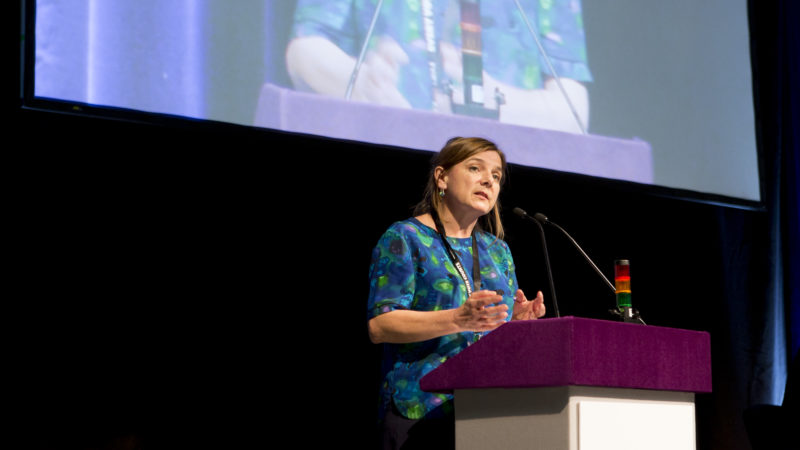In an exclusive interview with Left Foot Forward, the new figurehead of the UK union movement says: "We have to be where young people are – not where we are."

Something is changing in the trade union movement, if the new President of the TUC is anything to go by.
Looked at from a distance, the situation for unions is tough. Membership is down, with just over six million people members of a trade union today – compared to over 13 million in the late ‘70s.
I’ve been a member of a union since the age of about 17, something that would have been normal forty years ago. But today it’s an oddity: only one in ten 16-24 year olds are members of a union now. Against this backdrop, it’s easy for progressives to despair.
But there is new leadership in the movement – and with it, the potential to become newly relevant for the three million people in insecure work, for the millions of young people going from bar job to café job on zero hours contracts.
Last week, Sally Hunt – General Secretary of further and higher education union UCU – became President of the TUC.
Congress in Brighton saw the TUC enter its 150th year, and she’s keen to look to the next 150 years.
A big part of that is reaching out beyond unions’ comfort zones:
“We need to face up to the centrality of our need to recruit and engage young people in the trade union movement.
“A lot of people see this as an insurmountable problem. I don’t – what we have to do is reflect on our structures, how we engage with people who aren’t members and change how we communicate with them.”
The TUC have spent the last year identifying what matters to young people. But they’re also looking at new structures that will put these new focuses into practice.
That includes looking at fresh prototypes for ways of recruiting young people: “Some unions will find that quite challenging but it’s essential. We have to be where young people are – not where we are.”
Challenging is the correct word. There is still a perception that unions are only for older, male workers – despite most members now being women. Hunt is confident though: “We are able to meet this challenge, we just have to think outside the box.”
The actual practicalities of how to do this are harder than talking about it however. Hunt is in a good position to lead on this though: her union, the UCU, are about to launch a programme to give free membership to PhD students who teach – a large and exploited workforce within HE. She thinks it could send a message: “I’m sure other unions will be looking at that.”
And there is the question of how young people communicate with each other when the days of huge lunchtime union meetings are over. “It’s not about going to a meeting once a week. Other methods are equally effective.
“There isn’t an issue about young people’s activism – it’s where they choose to engage” that matters. “Young people are not wrong – we are.”
For some, this may feel like too little, too late. And Sally sympathises with this view, to an extent: “We haven’t necessarily done as well as we should in reflecting how people’s lives are in the workplace.”
I put the question directly to her – whether unions have been too slow to change. There was a reflective pause:
“Could we have done better – yes we could. But we are now moving. We have a steep hill to climb but the movement is now recognising that.”
The only way to carry on is to look forward, to change, to innovate or die: “Do I think we can do it? I don’t think we’ve got a choice.
“We’re not interested in being a relic – we’re interested in being an active part of our democracy.”
The need for unions in this age of insecurity is as strong as ever. “We’ve never once walked away from our core mission,” Hunt says.
And, while looking forward, there’s a proud history too – one which means the UK’s union movement is “held in such high regard abroad – it is honest, works for our members and campaigns on issues important to them.”
It’s encouraging to see that, amid a lot of general despondence on the left – whether about precarious work, union decline or a lack of solidarity amongst workers – Hunt is positive, without burying her head in the sand.
“Do I feel positive? Yes, I do – I don’t believe that a country such as ours can exist and be effective economically and as global force without a strong voice for working people.
“We are here and will continue to be here, to change and evolve. Sometimes we don’t do that as quickly as we should, but we are.
The task is huge – but Hunt is keen to take on the task: “There’s not a better movement in the world to be a part of.”
Josiah Mortimer is Editor of Left Foot Forward. Follow him on Twitter.
Left Foot Forward doesn't have the backing of big business or billionaires. We rely on the kind and generous support of ordinary people like you.
You can support hard-hitting journalism that holds the right to account, provides a forum for debate among progressives, and covers the stories the rest of the media ignore. Donate today.




0 Responses to “TUC President Sally Hunt on a changing union movement: “We’re not interested in being a relic””
Paul Clarkson
I totally engage with this spirit. Let it be based on action and adaptation rather than empty words, which are well meant. Look at what Usdaw is doing with McDonalds. There’s one model.